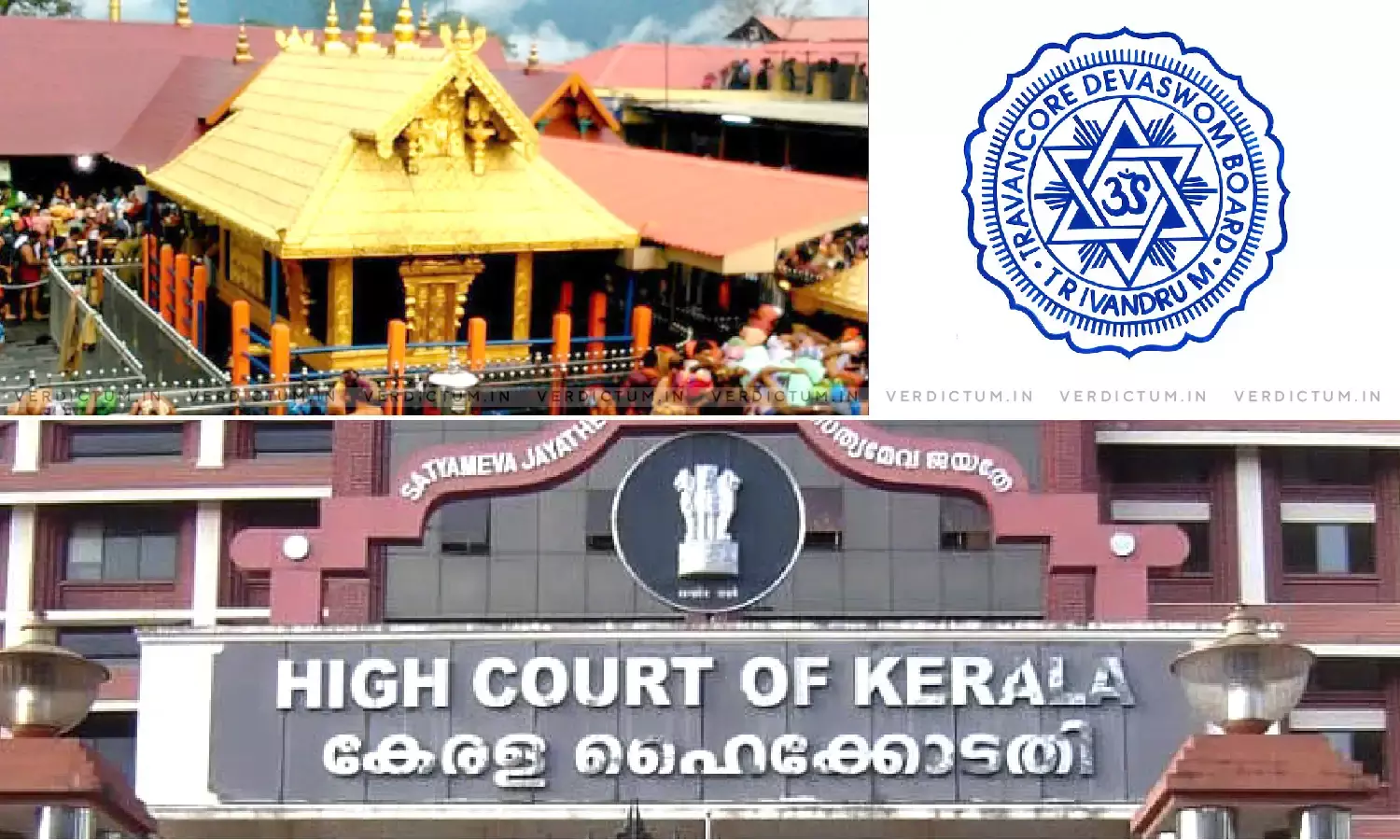"Review Petition Pending Before Apex Court": Kerala HC Dismisses Minor Girl's Plea To Visit Sabarimala Temple For Mandala Pooja
The Kerala High Court refuses to grant relief to a minor girl seeking directions to the Travancore Devaswom Board to permit her to visit Sabarimala Temple during the Mandala Pooja/Makaravilakku due to a pending review petition before the Supreme Court on similar issues.
The Division Bench of Justice Anil K. Narendran and Justice Harisankar V. Menon observed, “Since the question regarding the interplay between freedom of religion under Articles 25 and 26 of the Constitution of India and the provisions in Part III, particularly Article 14, and connected issues are pending before a Larger Bench of the Apex Court in Kantaru Rajeevaru (Sabarimala Temple Review-5 J.) v. Indian Young Lawyers Association [(2020) 2 SCC 1], in the review petitions arising out of the judgment of the Constitution Bench in Indian Young Lawyers Association v. State of Kerala [(2019) 11 SCC 1] the petitioner cannot invoke the writ jurisdiction of this Court under Article 226 of the Constitution of India, seeking the aforesaid reliefs. In such circumstances, this writ petition fails on the above ground and the same is accordingly dismissed, leaving open the legal and factual contentions raised by the petitioner.”
Advocate Manu Govind appeared for the Petitioner whereas Advocate G Biju appeared for the Respondents.
The Petitioner was a minor girl who filed the writ petition seeking directions to the Travancore Devaswom Board to permit her to visit Sabarimala Sree Dharma Sastha Temple during the Mandala Pooja/Makaravilakku season of 1199 ME (2023-24), without insisting upper age qualification, since she did not attain puberty.
Sabarimala Sree Dharma Sastha Temple is situated inside Periyar Tiger Reserve, which is a prominent pilgrim centre in Kerala, where lakhs of pilgrims trek the rugged terrains of Western Ghats to have darshan of Lord Ayyappa. Sabarimala Sree Dharma Sastha Temple and Malikappuram Temple come under the Travancore Devaswom Board.
The Court said that in Indian Young Lawyers Association v. State of Kerala (2019 SC), the Constitution Bench of the Apex Court considered the decision of the Division Bench of Kerala High Court in S. Mahendran v. Secretary, Travancore Devaswom Board and ors. (1993 Kerala), on a reference made by a Three-Judge Bench in Indian Young Lawyers Association v. State of Kerala (2017 SC), wherein the Constitution Bench had interpreted Article 25(1) of the Constitution of India to mean that all persons are equally entitled to practice the Hindu religion, which would include women between the age of 10 and 50.
The question regarding the interplay between freedom of religion under Articles 25 and 26 of the Constitution of India and Article 14 and connected issues were referred to a Larger Bench of the Apex Court in Kantaru Rajeevaru (Sabarimala Temple Review-5 J.) v. Indian Young Lawyers Association (2020 SC), in the review petitions arising out of the judgment of the Constitution Bench in Indian Young Lawyers Association v. State of Kerala (2019 SC).
The Court placed its reliance on the Travancore-Cochin Hindu Religious Institutions Act, 1950 (‘Act of 1950’) which was enacted to make provision for the administration, supervision and control of incorporated and unincorporated Devaswoms and of other Hindu Religious Endowments and Funds. Sabarimala Devaswom is an incorporated Devaswom mentioned in Schedule I of the Act, under Chengannur Group, Pathanamthitta Taluk.
The Court noted, “The Travancore Devaswom Board is duty-bound to see that the regular traditional rites and ceremonies, according to the practice prevalent in Sabarimala Devaswom and Malikappuram Devaswom, are performed promptly and to establish and maintain proper facilities in Sabarimala Sree Dharma Sastha Temple and Malikappuram Temple for the devotees. The Board is duty-bound to manage the properties and affairs of Sabarimala Devaswom and Malikappuram Devaswom and arrange for the conduct of the daily worship and ceremonies and of the festivals in Sabarimala Sree Dharma Sastha Temple and Malikappuram Temple according to its usage. The Board, being a trustee in the management of Sabarimala Devaswom and Malikappuram Devaswom, is legally bound to perform its duties with utmost care and caution.”
Accordingly, the Court dismissed the writ petition.
Cause Title: Snigdha Sreenath v. Travancore Devaswom Board and Ors. (Neutral Citation:2024:KER:39517)
Appearances:
Petitioner: Advocates Manu Govind and A Jayasankar
Respondents: Advocate G Biju




